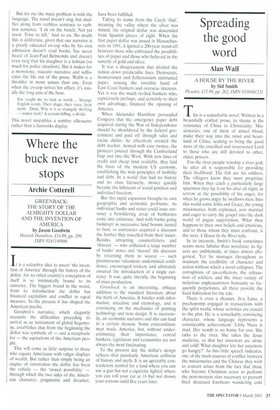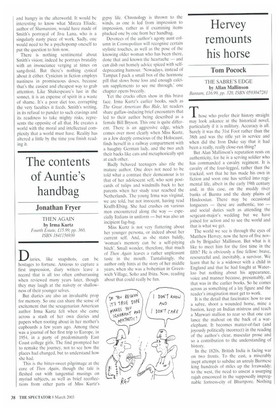Spreading the good word
Alan Wall
A HOUSE BY THE RIVER by Sid Smith
Picador, f15.99, pp. 262, ISBN 0330481231
This is a remarkable novel. Written in a beautifully crafted prose, its theme is the resistance of China to Christianity. Missionaries, one of them of mixed blood, make their way into the mind and heartland of China, seeking to bring the good news of the crucified and resurrected Lord to those who are still devoted to other, older, powers.
For the river people worship a river god; he after all is responsible for providing their livelihood. The fish are his soldiers. The villagers know they must propitiate him. When they catch a particularly large specimen they lay it on his altar all night, in sorrow at the possibility of his anger, for when he grows angry he swallows men. Into this world come John and Grace, the young missionaries, both orphaned, now married and eager to carry the gospel into the dark world of pagan superstition. What then happens to their own beliefs and emotions, and to those whom they must confront, is the story A House by the River tells.
In its intensity, Smith's book sometimes seems more fabular than novelistic; its figures are emblematic, at times almost allegorical. Yet he manages throughout to maintain the credibility of character and action without which a novel collapses. The corruptions of tax-collectors, the exhaustion of soldiers, and the sheer variety of nefarious unpleasantness humanity so frequently perpetrates, all these provide the local habitation for the tale.
There is even a shaman. Jivu Lanu, a psychopomp engaged in transactions with the spirit world, whose activities are crucial to the plot. He is a remarkably convincing character, whose language represents a considerable achievement: 'Little Niece is mad. Her womb is no home for you. She talks to the river. She takes the Jesus medicine, so that her ancestors are alone and cold! What daughter lets her ancestors go hungry?' As this little speech indicates, one of the main sources of conflict between the missionaries and the Chinese they wish to convert arises from the fact that those who become Christians cease to perform the post-mortem rites necessary to prevent their deceased forebears wandering cold and hungry in the afterworld. It would be interesting to know what Mircea Eliade, author of Shamanism, would have made of Smith's portrayal of Jivu Lanu, who is a singularly nasty piece of work. Sadly, one would need to be a psychopomp oneself to put the question to him now.
There is nothing sentimental about Smith's vision; indeed he portrays brutality with an insouciance verging at times on sang-froid. But there's nothing cynical about it either. Cynicism in fiction employs nastiness in promiscuous doses, because that's the easiest and cheapest way to grab attention. Like Shakespeare's lust in the sonnet, it is an expense of spirit in a waste of shame. It's a poor diet too, corrupting the very faculties it feeds. Smith's writing, in its refusal to pander to such cravings and its readiness to take mighty risks, represents the opposite of all that. He creates a world with the moral and intellectual complexity that a world must have. Reality has altered a little by the time you finish reading it.



































































 Previous page
Previous page